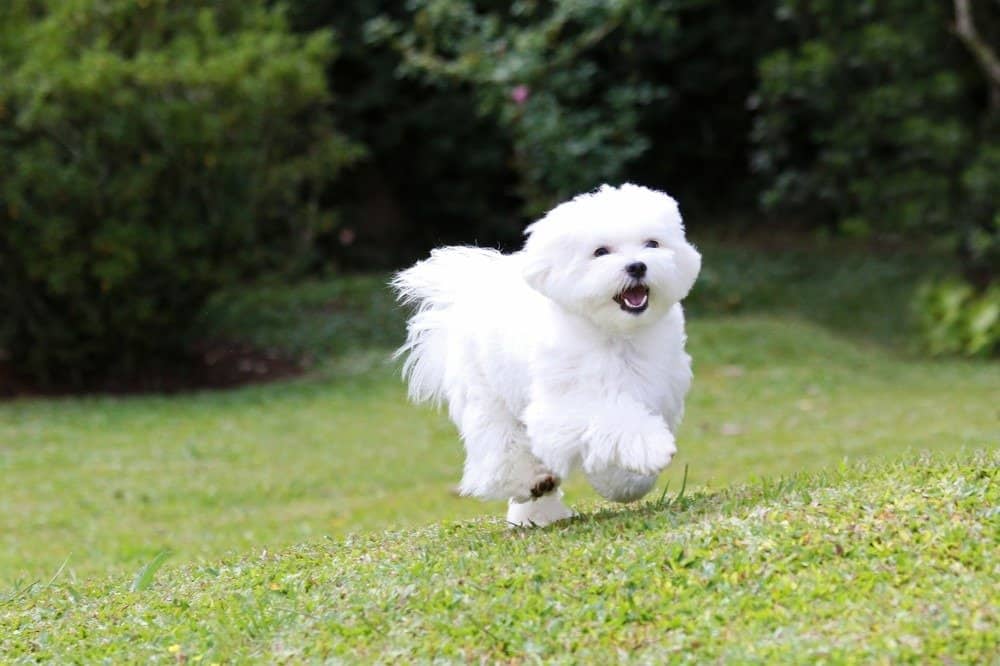If you are looking for a pocket-sized family dog, then look no further than the Maltese! This loving pup is one of the best companions around, as they form close bonds with their owners and love being at their side.
While their loving personalities come without question, there is more to the Maltese than their ease in companionship. If you are bringing home a Maltese puppy, then you need to know what’s ahead for your little one’s growth and progression.
Let’s discuss everything you need to know about the Maltese below, ranging from expected growth to training tips! Let’s get started!
Meet The Maltese

The Maltese is one of the oldest toy breeds on record, as their presence dates back to Egyptian times.
©Kimrawicz/Shutterstock.com
The Maltese is believed to be one of the oldest toy breed dogs around. From Aristotle’s mention of the Maltese to ancient Egyptian drawings of Maltese-like dogs, it’s clear this pup has been around for quite some time.
The exact origination of the Maltese breed is still under question, but we know this breed was further established by French and British royalty in the 16th and 17th centuries. These generations were responsible for the breeding and transport of the first Maltese dogs, leading to the Maltese we know and love today.
The Maltese is known for thriving in most family environments, and they do well in both homes and apartments. As long as you offer them plenty of attention and bonding opportunity, this pup is just happy to be at your side!
Maltese Progression: Growth and Weight Chart by Age
The following chart will break down what you can expect from your growing Maltese from birth to 2 years of age. The Maltese may not reach record-breaking size throughout their life, but it’s still important to know what’s ahead!
| Age | Male & Female Weight |
| Birth | 0.25-0.5 pounds |
| 1 Month | 0.5-1 pound |
| 6 Weeks | 0.5-1.25 pounds |
| 2 Months | 1-2 pounds |
| 3 Months | 1.75-3 pounds |
| 4 Months | 2.5-3.5 pounds |
| 5 Months | 3-4 pounds |
| 6 Months | 4-5 pounds |
| 7 Months | 4-6 pounds |
| 8 Months | 4-6 pounds |
| 9 Months | 4-7 pounds |
| 10 Months | 4-7 pounds |
| 11 Months | 4-7 pounds |
| 12 Months | 4-8 pounds |
| 2 Years | 4-8 pounds |
When Will My Maltese Stop Growing?
The Maltese is a toy breed dog, so this means they will reach their ultimate size much faster than their large breed friends. Your beloved Maltese will typically reach their mature height by the time they are 9 months of age, and they will stop growing completely around 10-11 months of age. Your Maltese may put on some extra weight in the year to follow, but this is often just their body filling out. Ultimately, your Maltese should stop growing around 10-11 months of age.
How Big Will My Maltese Be When It’s Fully Grown?
Now that you know when you can expect your Maltese to stop growing, it’s time to answer the question of how big your adult Maltese will be when they are fully grown. The adult size of your Maltese will vary based on genetics and sex, but the average Maltese weighs 4-8 pounds at adulthood.
Genetics plays a major role in your pup’s eventual size, so it’s important to see your Maltese’s parents in person if you want an accurate idea of their mature size. If this is important to you, be sure to insist on seeing both parents before adopting your little one.
When Should My Maltese Stop Eating Puppy Food?

Maltese puppies should eat a puppy diet until they are 10 months old, and then they can transition over to an adult diet created for small breed dogs.
©iStock.com/Foto-front
Puppy food is essential in helping your Maltese grow into a healthy and happy adult dog! Your Maltese may not tip the scale at any point throughout their lives, but they still need special support to help their bodies mature. Puppy food contains essential nutrients, protein, and calories needed to help our pups grow big and strong.
Your Maltese puppy should eat a puppy diet until they are 10 months old, as this is the period in which they will be completing most of their growth. You can safely switch your Maltese over to an adult diet for small breed dogs once they are 10 months old. Just be sure to transition them over to their new diet over a 2 week period, as changing their diet abruptly can lead to an upset stomach.
When Will My Maltese Start Losing Teeth?
Are you sick of your Maltese puppy’s razor sharp puppy teeth? Don’t worry, they won’t stick around for long! Your Maltese pup will start to lose their puppy teeth around 3 months of age, as this is when their adult teeth will erupt from the gums and push out their puppy chompers. This teething period will last for about 3 months, and your Maltese puppy should lose all their puppy teeth by the time they are 6 months old. By the time your Maltese puppy is 7 months old, you can expect them to have a full set of permanent adult teeth.
When Should I Start Training My Maltese?
The Maltese is known for being loving and loyal, but they still need the structure that basic obedience training offers. An untrained Maltese can fall into undesirable behaviors like excessive barking and biting, and these are not behaviors you want in your beloved companion.
We suggest diving into the training process from the moment you welcome your Maltese into the family. Starting their training process immediately will allow your pup to understand what you expect of them, and it also offers them plenty of structure moving forward. As long as your Maltese is at least 8 weeks old, they will be receptive to basic obedience commands.
What Commands Should I Teach My Maltese First?
If you are about to start training your Maltese pup, then you are likely wondering which commands you should start with first. While every home will have their own training priorities, these are the commands we think all Maltese owners should teach their pups.
- Sit
- Stay
- Come
- Lay down
- Drop it
Not only is basic obedience important for growing Maltese puppies, but socialization is essential as well. An unsocialized Maltese can struggle with fear and nervousness, so it’s important to introduce them to new things outside of your home. Ideal socialization for the Maltese includes meeting new people, meeting new dogs, hearing new sounds, and exploring new places.
Just be sure to have your Maltese puppy vaccinated first, as they will be susceptible to infectious illness otherwise. Your Maltese puppy is safe to explore the world after they have completed their puppy vaccination series.
When Should My Maltese Be House Broken?
The Maltese is very receptive to basic obedience training, but potty training can be a bit more challenging. The Maltese requires consistency and patience throughout each step of the housebreaking process, as their tiny bladders make it harder for them to hold their urine for long periods.
A few tips for successful potty training in the Maltese include taking her outside to go potty multiple times throughout the day, having a set and consistent feeding schedule, and being consistent with your training. It’s also important to offer plenty of treats and praise throughout the process, as the Maltese learns best with positive reinforcement. When following these steps, your Maltese will be potty trained by the time they are 7-8 months old.
When Will My Maltese Start To Calm Down?
If you have a hyper Maltese puppy on your hands, you may wonder when their energy source will finally start to dwindle. Your Maltese puppy should remain playful and eager to have fun throughout most of their life, but you can expect them to calm down significantly once they reach 3-4 years of age. They will still love to have fun with their family, but they should no longer be bouncing off the walls at this point.
When Should My Maltese Be Spayed or Neutered?
If you do not plan to breed your beloved Maltese, then you may be considering spaying or neutering them. We understand there is conflicting information about the best time to sterilize your pup, so we’re here to offer some guidance!
Female and male Maltese will reach sexual maturity once they are about 6 months old, so it is safe to spay or neuter them from this point on. Spaying or neutering your Maltese between the age of 6 months to one year is best according to veterinarians, as this is the perfect timeframe to alleviate hormonally driven behaviors, while still preventing reproductive health complications down the line.
Though it is ideal for most Maltese pups to be sterilized between 6 months to 1 year of age, we still suggest speaking with your vet about what is best for your Maltese.
Common Health Issues Seen In The Maltese
Most beloved Maltese pups will have 12 to 15 years of health and happiness, but there are a few common health conditions they may develop throughout their life. We want you to be as prepared as possible for any of these health complications in your Maltese, so let’s list the common issues you can be on the lookout for!
Patellar luxation: Patellar luxation in dogs is a misalignment of the canine knee joint. This causes instability in the dog’s kneecap, allowing the kneecap to move out of place during activity. Not only is this uncomfortable as it occurs, but it can lead to painful arthritis in the knee joint over time. A Maltese with patellar luxation may have occasional limping, skipping when they run, stiffness in the affected limb, and leg sensitivity.
Portosystemic shunts: Portosystemic shunts, or liver shunts, occur when there is an abnormal flow of blood between the dog’s liver and the rest of their body. The liver aids in detoxifying blood that runs through the organ, so when blood flows out of the liver improperly, this allows unfiltered toxins to enter the dog’s bloodstream. This can cause chronic gastrointestinal upset, significant weight loss, difficulty gaining weight, neurological complications, and seizures.
Shaker Syndrome: Shaker syndrome is a condition that is seen occasionally in white dogs. This condition often leads to troubling neurological symptoms ranging from muscle tremors to rapid eye movements, and even seizures in some cases. This condition often develops in young white dogs, so you typically see it in pups 3 years and under.
Tracheal collapse: Collapsing trachea occurs when the rings of cartilage in the dog’s trachea begin to weaken over time. This eventually leads the trachea to collapse on itself, making it challenging for the dog to breathe properly. This can not only impact a dog’s quality of life, but it can be life-threatening in severe cases.
Pictures of The Maltese as Puppies

Maltese puppies weigh under 1 pound when they are born!
©Francisco Gomez Perpinan/Shutterstock.com
Pictures of The Maltese at 6 Months

The Maltese is known to form close bonds with their owners, and they love nothing more than to spend time with those they love!
©Kimrawicz/Shutterstock.com
Pictures of the Fully Grown Maltese

The Maltese is an excellent dog for apartment living!
©Plernz/Shutterstock.com

The Maltese is prone to excessive barking, so it is important to socialize them from a young age!
©May Rice/Shutterstock.com
Are you ready to be Maltese parent?
The photo featured at the top of this post is © Tomsickova Tatyana/Shutterstock.com
Ready to discover the top 10 cutest dog breeds in the entire world?
How about the fastest dogs, the largest dogs and those that are -- quite frankly -- just the kindest dogs on the planet? Each day, AZ Animals sends out lists just like this to our thousands of email subscribers. And the best part? It's FREE. Join today by entering your email below.
Thank you for reading! Have some feedback for us? Contact the AZ Animals editorial team.






